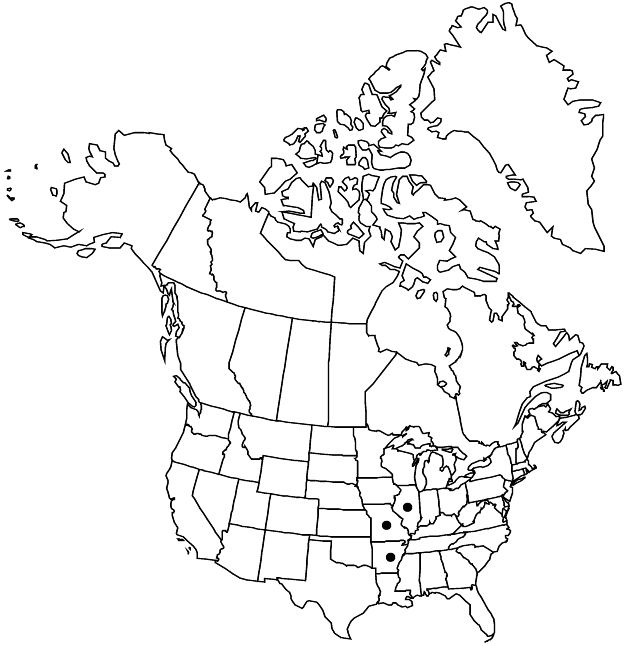Difference between revisions of "Crataegus nitida"
Bot. Gaz. 31: 231. 1901.
FNA>Volume Importer |
imported>Volume Importer |
||
| (6 intermediate revisions by 2 users not shown) | |||
| Line 14: | Line 14: | ||
|label=Endemic | |label=Endemic | ||
}} | }} | ||
| − | |basionyms={{Treatment/ID/ | + | |basionyms={{Treatment/ID/Basionym |
|name=Crataegus viridis var. nitida | |name=Crataegus viridis var. nitida | ||
|authority=Engelmann ex Britton & A. Brown | |authority=Engelmann ex Britton & A. Brown | ||
| + | |rank=variety | ||
| + | |publication_title=Ill. Fl. N. U.S. | ||
| + | |publication_place=2: 242. 1897 | ||
}} | }} | ||
|synonyms= | |synonyms= | ||
| Line 34: | Line 37: | ||
|distribution=Ark.;Ill.;Mo. | |distribution=Ark.;Ill.;Mo. | ||
|discussion=<p>Of conservation concern.</p><!-- | |discussion=<p>Of conservation concern.</p><!-- | ||
| − | --><p>Crataegus nitida is found from southern Illinois to eastern Arkansas along the Mississippi River flood plain; it appears to be rare. The species differs only slightly from C. viridis var. viridis, mainly in the larger fruit, more pronounced leaf marginal teeth, and more coriaceous mature leaves. Horticultural plants labeled C. nitida are usually a C. crus-galli × C. viridis cross.</p> | + | --><p><i>Crataegus nitida</i> is found from southern Illinois to eastern Arkansas along the Mississippi River flood plain; it appears to be rare. The species differs only slightly from <i>C. viridis </i>var.<i> viridis</i>, mainly in the larger fruit, more pronounced leaf marginal teeth, and more coriaceous mature leaves. Horticultural plants labeled <i>C. nitida</i> are usually a <i>C. crus-galli</i> × <i>C. viridis</i> cross.</p> |
|tables= | |tables= | ||
|references= | |references= | ||
| Line 43: | Line 46: | ||
-->{{#Taxon: | -->{{#Taxon: | ||
name=Crataegus nitida | name=Crataegus nitida | ||
| − | |||
|authority=(Engelmann ex Britton & A. Brown) Sargent | |authority=(Engelmann ex Britton & A. Brown) Sargent | ||
|rank=species | |rank=species | ||
| Line 58: | Line 60: | ||
|publication year=1901 | |publication year=1901 | ||
|special status=Conservation concern;Endemic | |special status=Conservation concern;Endemic | ||
| − | |source xml=https:// | + | |source xml=https://bitbucket.org/aafc-mbb/fna-data-curation/src/2e0870ddd59836b60bcf96646a41e87ea5a5943a/coarse_grained_fna_xml/V9/V9_899.xml |
|subfamily=Rosaceae subfam. Amygdaloideae | |subfamily=Rosaceae subfam. Amygdaloideae | ||
|tribe=Rosaceae tribe Gillenieae | |tribe=Rosaceae tribe Gillenieae | ||
Latest revision as of 23:00, 5 November 2020
Trees, 100 dm. Stems: mature trunk bark broken into gray-brown platelike scales; twigs: new growth not recorded, 1-year old chestnut brown, subcoriaceous; thorns on twigs absent or few, 1–2-years old chestnut brown, 2.5–4 cm. Leaves: petiole 1.5–2.5 cm, length 33% blade, adaxially pubescent young, sparsely glandular; blade broadly lanceolate to narrowly rhombic-elliptic, 5–8 cm, subcoriaceous, base tapered, lobes 0, or 1 or 2(or 3) per side, sinuses shallow, max LII (0–)5–10(–20)%, margins strongly serrate (teeth 2–3 mm), venation craspedodromous, veins 5 or 6 per side, apex acute to acuminate, surfaces glabrous. Inflorescences 10–20-flowered, dome-shaped; branches glabrous. Flowers 15–18 mm diam.; hypanthium glabrous; sepals 7 mm, margins glandular-denticulate, abaxially glabrous; anthers cream or pale pink. Pomes brick red to red, pruinose on drying, suborbicular, 8–12 mm diam.; sepals spreading. 2n = 51.
Phenology: Flowering Apr; fruiting Sep–Oct.
Habitat: Flood plains
Elevation: 10–200 m
Distribution

Ark., Ill., Mo.
Discussion
Of conservation concern.
Crataegus nitida is found from southern Illinois to eastern Arkansas along the Mississippi River flood plain; it appears to be rare. The species differs only slightly from C. viridis var. viridis, mainly in the larger fruit, more pronounced leaf marginal teeth, and more coriaceous mature leaves. Horticultural plants labeled C. nitida are usually a C. crus-galli × C. viridis cross.
Selected References
None.